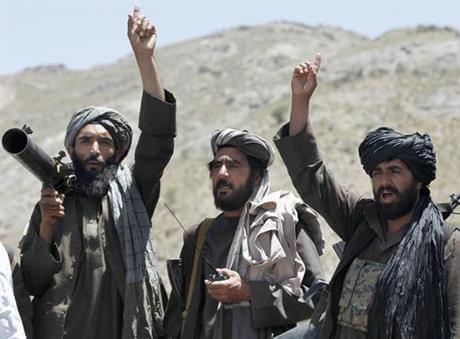
By KATHY GANNON
The Taliban have appointed a new military chief as the insurgents try to gain more ground in Afghanistan rather than talk peace under a new leadership, Taliban officials said in telephone interviews over the weekend.
They said that the appointment of Mullah Ibrahim Sadar, once a close ally of Taliban founder Mullah Mohammed Omar, heralds a commitment to confrontation at a time when multiple governments are trying to coax the Taliban to the negotiating table.
Sadar is a battle-hardened commander, who gained prominence among Taliban foot soldiers following the movement’s overthrow in 2001 in the U.S.-led invasion. The two officials both spoke on condition of anonymity because they were not authorized to speak publicly for the Taliban.
Sadar’s appointment coincides with an uptick in Taliban attacks against Afghan security forces. The United States has sent additional troops to Afghanistan’s southern Helmand province, where its capital, Lashkar Gah, is under pressure. The provincial council head Kareem Atal earlier said roughly 80 percent of Helmand is already under Taliban control.
by TaboolaMore from AP
The Latest: UN schedules meeting to discuss role in Colombia
NKorea missile test adds to ‘Military First’ celebration
So far this month, Taliban fighters have attacked Afghan security forces in northern Kunduz province, briefly taking control of a district headquarters. The militants also overran a district in northern Baghlan province and in eastern Paktia province. Meanwhile, in eastern Nangarhar province, Taliban militants are fighting pitched battles with security forces. Afghanistan’s Ministry of Defense says its security forces are waging operations in 15 provinces.
Mohammad Akbari, a member of Afghanistan’s High Peace Council, which is tasked with talking peace with insurgent groups, said there has been no progress in talks since Taliban leader Mullah Akhtar Mansour was killed in a U.S. drone strike in May in Pakistan. Mansour was succeeded by Mullah Haibatullah Akhundzada, and the notorious Haqqani network gained a prominent role in the leadership structure.
The Haqqani network, branded a terrorist organization by the U.S., has been accused by both Washington and Kabul of carrying out some of the most brutal attacks in the past 15 years of war in Afghanistan. The Haqqanis are believed to have a healthy war chest and are able to attract funding even as competition among Islamic organizations grows. With their recent ascendency in the Afghan Taliban, the Haqqanis have moved to unify the fractured insurgency.
“I can’t see any green light toward peace by the Taliban for Afghanistan and instead we have seen an increase in their fighting in the provinces,” Akbari told The Associated Press.
Since Mansour’s death, Pakistan’s Interior Ministry has launched a stepped-up campaign to verify the identity of roughly 1.5 million Afghans living in Pakistan, many possessing Pakistani identity cards, some legally obtained and others illegally acquired. Mansour was carrying a Pakistani passport and identity card under an alias.
The crackdown has resulted in the withdrawal of thousands of suspicious identity cards. Pakistan’s Interior Minister Chaudhry Nisar Ali Khan said that in the last four years, roughly 80,000 suspicious identity cards have been revoked. He didn’t have a figure of the number of cards withdrawn in the latest campaign.
Taliban officials say their fighters, whose families are living in Pakistan, are getting caught up in the crackdown — forcing them to find shelter in Afghanistan. The officials said as a result, in order to accommodate their fighters, they need to expand their territory for practical reasons in addition to their standing military goals.
Pakistan has been bitterly criticized by the Afghan government for not doing more to arrest and expel Taliban fighters from its territory — particularly the Haqqani network, which is blamed by Afghanistan for many of the most brutal attacks. Pakistan, meanwhile, has carried out military operations in its tribal regions that border Afghanistan, and accuses Afghanistan of harboring its own Taliban insurgents who have been carrying out attacks in Pakistan.
Following last week’s militant attack on the American University in Kabul, the Afghan government sent three telephone numbers to Pakistan’s military, believed to belong to those involved in planning the attack, seeking Pakistan’s assistance in tracking down and arresting the culprits. The assault killed 13 people and wounded dozens more.
___
Associated Press Writers Rahim Faiez and Amir Shah in Kabul, Afghanistan, contributed to this report.
Discuss this story on Twitter or Facebook



